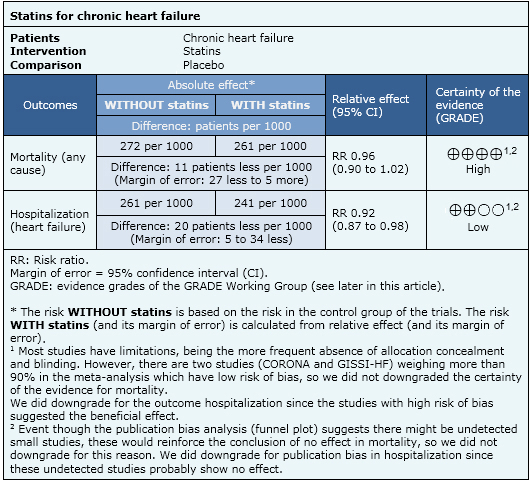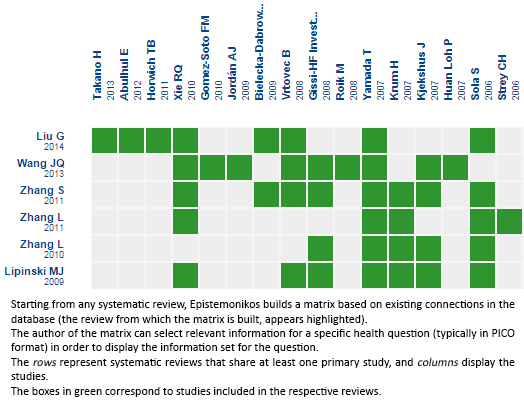Epistemonikos summaries
← vista completaPublished on May 28, 2015 | http://doi.org/10.5867/medwave.2015.04.6140
Are statins beneficial for chronic heart failure?
¿Son beneficiosas las estatinas en la insuficiencia cardíaca crónica?
Abstract
There is controversy about the role of statins in chronic heart failure. Even though it is clear they decrease inflammatory markers and probably improve some echocardiographic parameters, it is not clear if they impact clinically important outcomes. Searching in Epistemonikos database, which is maintained by screening 30 databases, we identified six systematic reviews including 21 randomized trials. We combined the evidence using meta-analysis and generated a summary of findings table following the GRADE approach. We concluded statins in chronic heart failure do not decrease mortality, and might lead to little or no decrease in hospitalizations for heart failure or other clinical outcomes.
Problem
Apart from their main effect on serum lipid levels, statins have pleiotropic properties, such as antihypertrophic, antifibrotic, antioxidant and inhibitors of neurohumoral activation, all of which are involved in the patophysiology of heart failure. Some studies have shown an improvement in ejection fraction and a decrease in inflammatory biomarkers, however it is not clear if they impact clinically important outcomes.
Methods
We used Epistemonikos database, which is maintained by screening more than 30 databases, to identify systematic reviews and their included primary studies. With this information we generated a structured summary using a pre-established format, which includes key messages, a summary of the body of evidence (presented as an evidence matrix in Epistemonikos), meta-analysis of the total of studies, a summary of findings table following the GRADE approach and a table of other considerations for decision-making.
|
Key messages
|
About the body of evidence for this question
|
What is the evidence. See evidence matrix in Epistemonikos later |
We found six systematic reviews [1-6] including 29 primary studies [7,8,9,10,11,12,13,14,15,16,17,18,19,20,21,22,23,24,25,26,27,28,29,30,31,32,33,34,35], from which 21 correspond to randomised controlled trials [7],[9-12],[15-21],[26-34]. This table and the summary in general are based on the latter. |
|
What types of patients were included |
The studies included patients with heart failure from all causes receiving standard treatment. Most studies only included patients with low ejection fraction, except three studies [16],[19],[33], but the average ejection fraction on these was 33%, 42% and 28% respectively. Four studies[10],[11],[28],[35], included patients with NYHA functional class I, 18 functional class II [7],[10-12],[15-21],[25],[27-29],[33-35]; all included functional class III and six included functional class IV [16],[17],[25],[29],[30],[34]. The average LDL cholesterol level ranged from 96 to 167 mg/dL in the different studies. |
|
What types of interventions were included |
Fifteen studies evaluated atorvastatin [7],[10-12],[15],[20],[26],[28-35], three rosuvastatin [16-18], one cerivastatin [19], one pitavastatin [27] and one simvastatin [21]. All studies used placebo as comparator. |
|
What types of outcomes were measured |
Total mortality, cardiovascular mortality, hospitalization for heart failure, nonfatal myocardial infarction or stroke, echocardiographic parameters, inflammatory biomarkers, B-type Natriuretic Peptide (BNP) levels, QT interval, NYHA functional class. |
Summary of findings
The information on the effects of statins is based on 21 randomized controlled trials. Sixteen studies reported mortality by any cause and 14 studies reported the risk of hospitalization for heart failure.
- Statins in chronic heart failure do not decrease mortality. The certainty of the evidence is high.
- Statins in chronic heart failure might lead to little o no decrease in hospitalizations for heart failure. The certainty of the evidence is low.

Statins beneficial for chronic heart failure
Other considerations for decision-making
|
To whom this evidence does and does not apply |
|
| About the outcomes included in this summary |
|
| Balance between benefits and risks, and certainty of the evidence |
|
| Resource considerations |
|
|
Differences between this summary and other sources |
|
| Could this evidence change in the future? |
|
How we conducted this summary
Using automated and collaborative means, we compiled all the relevant evidence for the question of interest and we present it as a matrix of evidence
 Full size
Full size Follow the link to access the interactive version Statins for chronic heart failure

Notes
The upper portion of the matrix of evidence will display a warning of “new evidence” if new systematic reviews are published after the publication of this summary. Even though the project considers the periodical update of these summaries, users are invited to comment in Medwave or to contact the authors through email if they find new evidence and the summary should be updated earlier. After creating an account in Epistemonikos, users will be able to save the matrixes and to receive automated notifications any time new evidence potentially relevant for the question appears.
The details about the methods used to produce these summaries are described here http://dx.doi.org/10.5867/medwave.2014.06.5997.
Epistemonikos foundation is a non-for-profit organization aiming to bring information closer to health decision-makers with technology. Its main development is Epistemonikos database (www.epistemonikos.org).
These summaries follow a rigorous process of internal peer review.
Conflicts of interest
The authors do not have relevant interests to declare.

